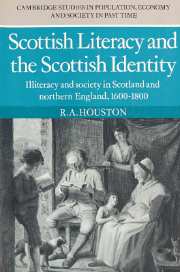 Scottish Literacy and the Scottish Identity
Scottish Literacy and the Scottish Identity Published online by Cambridge University Press: 11 November 2009
Despite the continued importance of oral forms, the claims made for literacy and education both by early modern reformers and by later historians have been far from modest. We noticed in chapter 4 how difficult it is to explain why and how men and women came to learn reading and writing. In chapter 6 we also introduced the idea that historians have been influenced by a powerful intellectual tradition, which assumes that literacy is automatically a benefit to individual and society, and a value–free one at that. In Tolstoy's Anna Karenina, Levin's brother Koznyshev asks rhetorically: 'Can there be two opinions on the advantage of education? If it's a good thing for you, it's a good thing for everyone.' This assumption, implicit and explicit, pervades writing on literacy and education.
At the same time the broad outlines of literacy attainments which we demonstrated in chapter 2 are really only a starting–point for understanding the various implications of the ability to read and write. Statistics are important if we are to test our assumptions about literacy and to generate new hypotheses which we can investigate. However, we must also explain the patterns which we uncover and unravel their importance by placing them in the context of the society as a whole. Harvey Graff sums up the importance of context very neatly when he observes that 'The measurement of the distribution of literacy in a given population may reveal relatively little about the uses to which those skills could be put and the demands they could meet.'
To save this book to your Kindle, first ensure [email protected] is added to your Approved Personal Document E-mail List under your Personal Document Settings on the Manage Your Content and Devices page of your Amazon account. Then enter the ‘name’ part of your Kindle email address below. Find out more about saving to your Kindle.
Note you can select to save to either the @free.kindle.com or @kindle.com variations. ‘@free.kindle.com’ emails are free but can only be saved to your device when it is connected to wi-fi. ‘@kindle.com’ emails can be delivered even when you are not connected to wi-fi, but note that service fees apply.
Find out more about the Kindle Personal Document Service.
To save content items to your account, please confirm that you agree to abide by our usage policies. If this is the first time you use this feature, you will be asked to authorise Cambridge Core to connect with your account. Find out more about saving content to Dropbox.
To save content items to your account, please confirm that you agree to abide by our usage policies. If this is the first time you use this feature, you will be asked to authorise Cambridge Core to connect with your account. Find out more about saving content to Google Drive.